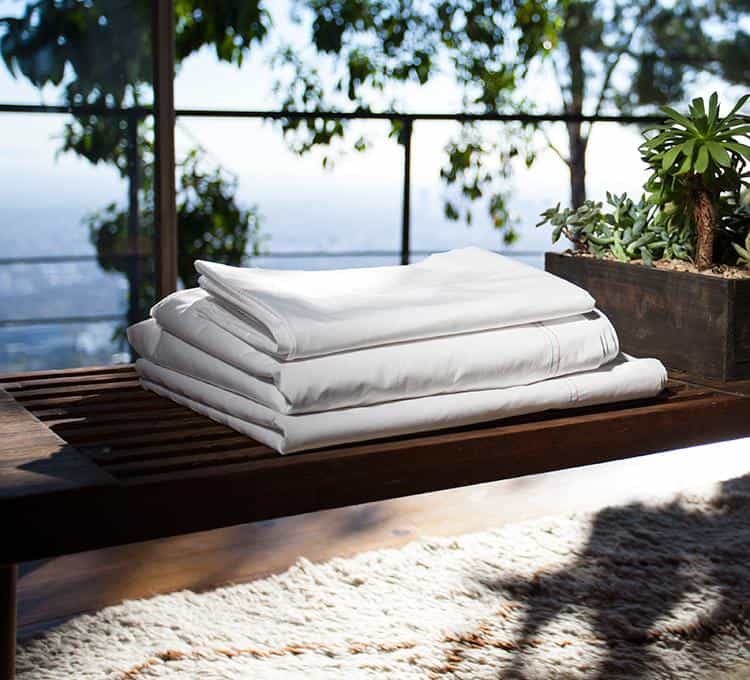Alterra Pure launched earlier this year with a focus on environmental and social sustainability. They bring slow living methods to the home goods market.
A new venture, Alterra Pure was founded by Kevin Dixon and Wanda Weller. Kevin has decades of textile experience in both apparel and home textiles having worked on many of the more well known home bedding brands launched recently. He also consulted on two smart textile projects at famed incubator Y-Combinator.
Listen to Causeartist podcasts here.
Wanda Weller is a renown designer having spent ten years as design director at Patagonia, so her environmental and social sustainability credentials are strong. Wanda also served as Design Director at Adidas prior to her tenure at Patagonia.
The company weaves its products in an equitable partnership with a collective of villages, farms and facilities in Odisha, India. This farming cooperative practices low-impact production and non-irrigation techniques.
While there are other organic and fair trade offerings in the market place, Alterra Pure’s extensive experience in textile manufacturing allows them to take a step beyond the normal business models.
With organic cotton production in decline in recent years, fake organic product proliferates in a market where organic cotton is in short supply. Alterra Pure first noticed the problem when their founders were making home textiles for other brands.
To provide peace of mind sought organic bedding, Alterra Pure not only certifies through the GOTS organic cotton standard, but they also test the fiber and finished fabric to assure organic integrity.
Some major retailers experienced problems with integrity of organic cotton in recent years and were required to pull some product from shelves after finding the product was not actually organic.

This focus on ingredients mirrors much of what is happening in food in the USA and elsewhere. The artisnal ingredients in hand crafted foods mirrors the direction we see at Alterra Pure.
Co-Founder Wanda Weller, formerly design director at Patagonia, was recently featured on design trend podcast PSFK Purple explaining how focus on ingredients and simplicity lends itself to sustainable design.
Alterra Pure also focuses on social equity. In working with the organic cotton growing cooperative, Alterra Pure found that even with Fair Trade wages, it wasn’t enough to entice farmers into organic farming.
Alterra Pure is dedicated to providing additional benefit by funding and managing individual projects within the organic growing villages. These project based programs are very much like we see in Cotopaxi and Miir.

Transparency is important in any business venture today. We see with this company that they provide every detail from the seed type and source all the way to the organic approved solutions used in fabric finishing.
To punctuate this point, Alterra Pure has an extreme position on disclosure and provides every detail possible on their website in their “Under the Covers” section.
There are many companies using “transparency” as a buzzword of recent, it has become a new form of greenwashing. It is refreshing to see actual transparency at levels not realized before in textiles.

To enable the company to keep control of it’s products and ingredients, they offer only one fabric at present, a heirloom organic cotton percale. They offer styles including organic sheet sets, duvet covers, and pillow cases along with bundles of their bedding at a slight discount.
Keeping the number of fabric offering tight borrows from the fast fashion industry, but this approach takes an environmental turn. Reduced numbers of fabric in the collection allows better control and allows the organic integrity where other brands struggle.
Asked why certified organic, Alterra Pure says that certified organic is the best option for the environment and the customer. There are other standards such as Oeko Tex, but Alterra Pure says that Oeko Tex is better served for man made fibers. Says Dixon, “Hohensetein Institute and Oeko Tex is one of the most respected groups in textiles today.
But the Oeko Tex standard does not have the rigorous standards for cotton as does GOTS Certification.” He cites Formaldehyde as an example.
Oeko Tex follows the ECHA limits of requiring fabrics to test at 70ppm or lower, GOTS certification requires a level of 16ppm or lower. Dixon says both are good standards and formaldehyde is just one of many areas where GOTS goes beyond Oeko Tex in stricter requirements.
We asked Alterra Pure the benefit of organic versus conventional. They point out that some consumers don’t want to bring products that may have pesticide residue into their homes while others may want to purchase products that do not bring pesticides into the environment. In either case, organic is the best course to help make for a better environment and home.
Related Post:
https://causeartist.com/modern-products-to-start-creating-your-socially-conscious-home/








